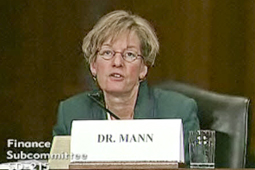Mann: Alter trade pacts to preserve U.S. digital edge
She also advocates offering green cards to foreigners who earn advanced degrees

Barbara and Richard M. Rosenberg Professor of Global Finance Catherine Mann
Mann told members of the Senate Finance Committee's Subcommittee on International Trade, Customs, and Global Competitiveness, that existing trade structures, particularly the General Agreement on Trade in Services (GATS), can’t keep pace with the rapid evolution of technology. GATS liberalizes trade on a case-by-case, country-by-country basis, according to a negotiated "schedule." Because information-technology products change quickly as their functionality evolves, the schedule is outmoded as soon as it is negotiated, she said.
“U.S. negotiators must stand fast and find allies on this issue of evolving functionality in international trade to support the concept of openness as the norm, rather than have to negotiate for each new IT product,” Mann said. “Otherwise the problem will persist and U.S. producers and exporters will face barriers to the their high-tech goods and services. That will affect our competitiveness.”
She recognized, however, that reopening negotiations would be a challenge.
“Countries are loath to reopen negotiations they think they’ve already completed because it’s a zero-sum activity: for everything they gain, they have to give something up,” Mann said. “And countries know that if they allow a greater U.S. foreign presence it will have a deleterious effect on their domestic companies because we are very good at what we do -- specially on the high-tech services end.”
Mann also told the committee that the U.S. must work harder with international standard-setting bodies to come up with a set of mutually agreed standards for digital products. The issue of how particular populations view personal data is a difficult but important place to start, she suggested.
“The average European views data privacy very differently than the average American. They don’t want cookies following them all around on the Internet,” Mann said. “American consumers, on the other hand, willingly provide data to companies because they believe that on balance the company will use this data to the customer’s personal benefit.”
In light of this discrepancy, European governments and standard-setting bodies tend to reflect the attitudes of their constituents, and have little tolerance or appetite for products and services that have more relaxed privacy settings.
“We need to recognize that many foreign governments are not just being obstinate: they are reflecting the will of a significant part of their populations,” says Mann. "There are big differences in attitudes about data privacy usage and privacy systems, and we need to address this issue on a country-by-country, regional group by regional group basis, to come up with a mutual understanding for how to treat personal data that will not act as a detriment to the flow of services.”
Asked by the committee what the government can do to ensure the U.S. maintains its position as a leading global force in economic development and innovation, Mann answered that it should give a green card to every foreign student who has completed an advanced degree here.
“These students come to America because they believe it is the most innovative, entrepreneurial place in the world. They bring their intellectual power and energy here, and then when they graduate, we tell them to go home,” she says. “They will then go back to their countries and use their entrepreneurial capacity to become our competitors. We attract the best and the brightest to our universities and then we tell them to leave. It doesn’t make sense.”
Categories: Business, International Affairs





